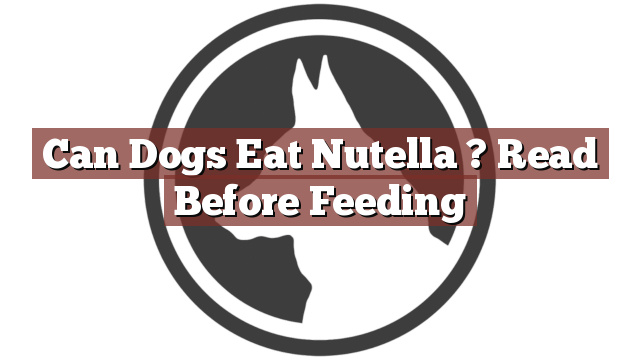Understanding Your Dog’s Dietary Needs
As a responsible pet owner, it is essential to understand your dog’s dietary needs to ensure they remain healthy and happy. Dogs require a balanced diet that consists of proteins, carbohydrates, fats, vitamins, and minerals. While some human foods can be safely shared with our furry friends, others can be harmful or even toxic to them. Therefore, it is crucial to be aware of what foods are safe for dogs and what should be avoided.
Can Dogs Eat Nutella? Read Before Feeding
Can dogs eat Nutella? This is a question that often arises among dog owners who may be tempted to share this popular chocolate-hazelnut spread with their four-legged companions. However, the answer is a resounding no. Nutella contains ingredients that are potentially harmful to dogs, making it unsuitable for their consumption.
Nutella contains cocoa, which is known to be toxic to dogs. Cocoa contains theobromine, a stimulant that dogs cannot metabolize as effectively as humans can. Consuming even small amounts of cocoa can lead to symptoms such as vomiting, diarrhea, rapid breathing, increased heart rate, tremors, and in severe cases, it can cause seizures or even be fatal for dogs.
Pros and Cons of Feeding Nutella to Dogs
When considering the pros and cons of feeding Nutella to dogs, the cons far outweigh any potential benefits. While Nutella may be a delicious treat for humans, it poses several risks to dogs. Apart from the theobromine content, Nutella is also high in sugar and fat, which can lead to weight gain, obesity, and related health issues in dogs. Moreover, the hazelnuts in Nutella can be difficult for dogs to digest, potentially leading to gastrointestinal problems.
On the other hand, there are no significant nutritional benefits that Nutella can offer to dogs. It is important to remember that dogs have different dietary requirements than humans, and their bodies are not built to process certain ingredients like cocoa and excessive sugar. Therefore, it is best to avoid feeding Nutella to your furry friend altogether.
Conclusion: Consider Healthier Alternatives for Your Dog
In conclusion, it is clear that Nutella is not safe for dogs to consume. The potential risks associated with feeding Nutella, such as theobromine toxicity, high sugar and fat content, and digestive issues, make it an unsuitable choice for your furry friend. Instead, it is crucial to provide your dog with a balanced diet that includes specially formulated dog food and treats that are specifically designed to meet their nutritional needs.
If you are looking to treat your dog occasionally, there are several safe and healthy alternatives available. You can opt for dog-friendly treats that are specifically made for canine consumption. Additionally, there are some fruits and vegetables, such as apples, carrots, and blueberries, that can be shared with your dog in moderation. Always consult with your veterinarian before introducing new foods to your dog’s diet to ensure their safety and well-being.
Remember, the health and well-being of your beloved pet should always be a top priority, and by understanding their dietary needs and making informed choices, you can provide them with a long and happy life.
Thank you for taking the time to read through our exploration of [page_title]. As every dog lover knows, our furry friends have unique dietary needs and responses, often varying from one canine to another. This is why it's paramount to approach any changes in their diet with caution and knowledge.
Before introducing any new treats or making alterations to your dog's diet based on our insights, it's crucial to consult with a veterinarian about [page_title]. Their expertise ensures that the choices you make are well-suited to your particular pet's health and well-being.
Even seemingly harmless foods can sometimes lead to allergic reactions or digestive issues, which is why monitoring your dog after introducing any new food item is essential.
The content provided here on [page_title] is crafted with care, thorough research, and a genuine love for dogs. Nevertheless, it serves as a general guideline and should not be considered a substitute for professional veterinary advice.
Always prioritize the expert insights of your veterinarian, and remember that the health and happiness of your furry companion come first.
May your journey with your pet continue to be filled with joy, love, and safe culinary adventures. Happy reading, and even happier snacking for your canine friend!

